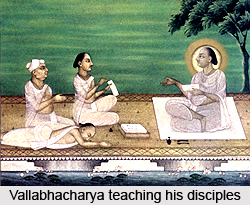 Life of Vallabhacharya was spent in serving God and propagating the philosophy of Advaita Vedanta. He was the founder of Pushti Marg. His parents were Brahmin who was natives of Andhra Pradesh. His father was Lakshman Bhatt and Illamargaru was his mother. Parents of Lakshman had performed ninety-five "Yagnas". It was informed to him by his "Guru" that the birth of an "Avtar" would take place after completion of hundred Yagnas. His father had started from his village with his family members to reach Varanasi. During his stay in Varanasi he had performed all five Somayagnas. However owing to external circumstances he had to leave the place. On his way he halted at Champaranya, a forest area in Raipur District of Madhya Pradesh. The terror and physical strain suffered by his wife resulted in the premature birth of a child. As the child showed no signs of life the parents sadly placed it under a tree wrapped in a cloth and proceeded to the village. At night they had a dream in which God appeared and informed that he had been born as their child which they had thought as dead. They went to the spot and found the baby enveloped by fire as its protector. The mother received her divine baby from the fire. Vallabh was the name given to the child.
Life of Vallabhacharya was spent in serving God and propagating the philosophy of Advaita Vedanta. He was the founder of Pushti Marg. His parents were Brahmin who was natives of Andhra Pradesh. His father was Lakshman Bhatt and Illamargaru was his mother. Parents of Lakshman had performed ninety-five "Yagnas". It was informed to him by his "Guru" that the birth of an "Avtar" would take place after completion of hundred Yagnas. His father had started from his village with his family members to reach Varanasi. During his stay in Varanasi he had performed all five Somayagnas. However owing to external circumstances he had to leave the place. On his way he halted at Champaranya, a forest area in Raipur District of Madhya Pradesh. The terror and physical strain suffered by his wife resulted in the premature birth of a child. As the child showed no signs of life the parents sadly placed it under a tree wrapped in a cloth and proceeded to the village. At night they had a dream in which God appeared and informed that he had been born as their child which they had thought as dead. They went to the spot and found the baby enveloped by fire as its protector. The mother received her divine baby from the fire. Vallabh was the name given to the child.
The face of the image of Shrinathji, came to light on Mount Govardhan on the very day when he was born. He inspired later Shrinathji to introduce Seva into Pushti Marg. The birth of Shri Vallabacharya coincided with the manifestation of the Mukharvind of Shrinathji. Later the entire family returned to Varanasi. His education started at the age of six with the study of the Vedas. At the age of eleven he had surpassed his teachers with his sharp reasoning. Shree Vallabhacharya meditated and spoked to his followers in a peaceful area.
His father passed away at the age of eleven. More than fifteen years of his life was spent in visiting various pilgrimages and expanding his teachings and perfecting his doctrines. During his trip to Gokarna he was invited by the king of Vijayanagara Empire. Here he introduced his views on Vedas, Gita, the Brahma-Sutras and the Bhagvat. When he was in Pandharpur, Shri Vitobha told him to get married so that the Pushti Marg could be spread for generations.
He settled down in Varanasi and married Madhu Mangalam. He had two sons also. He detached himself from the world at the age of fifty two and started meditating and singing the songs of praise of Lord Krishna. Prior to this he took a vow of silence on the Hanuman Ghat in Varanasi at the bank of Ganga River.









